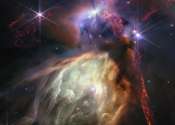Peptides on interstellar ice: Study finds presence of water molecules not a major obstacle for formation
A research team led by Dr. Serge Krasnokutski from the Astrophysics Laboratory at the Max Planck Institute for Astronomy at the University of Jena had already demonstrated that simple peptides can form on cosmic dust particles. ...









